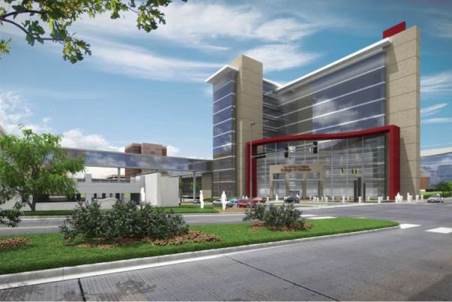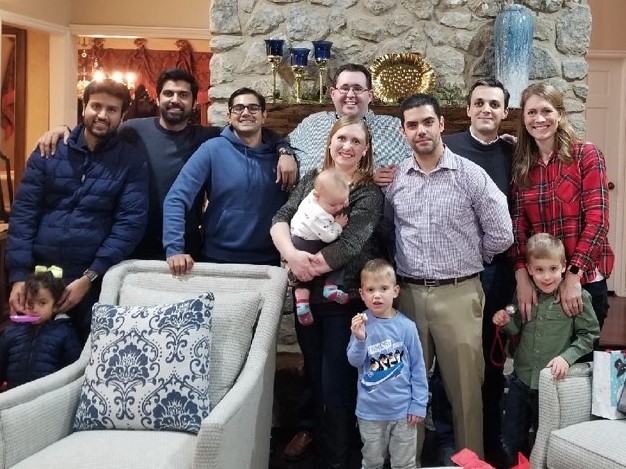The GI section is located in the College of Medicine Building (built in September 2016). The section currently has 13 full-time faculty and 2 part-time faculty  to provide the educational support for 8-9 trainees. Volunteer clinical faculty participate in our educational conferences. The section’s research activities involve gastrointestinal stem cells (especially their involvement in cancer development, prevention, and therapy), study of Barrett's esophagus, study of pancreatic cancer, colon cancer screening, novel viral hepatitis therapies, clinical outcomes of endoscopic ultrasound, and inflammatory bowel disease.
to provide the educational support for 8-9 trainees. Volunteer clinical faculty participate in our educational conferences. The section’s research activities involve gastrointestinal stem cells (especially their involvement in cancer development, prevention, and therapy), study of Barrett's esophagus, study of pancreatic cancer, colon cancer screening, novel viral hepatitis therapies, clinical outcomes of endoscopic ultrasound, and inflammatory bowel disease.
We have two faculty members that due to their interest in GI oncology have included novel endoscopic therapies into their practice, including endoscopic mucosal resection and radiofrequency ablation procedures, to remove early cancerous and precancerous lesions from the lining of the digestive tract with endoscopic instruments. Currently, we are the major center in the state for endoscopic ultrasound and ERCP. These specialized endoscopic interventions have made the University of Oklahoma the most premier digestive care facility in the state.
The thirty-six month fellowship is structured so that approximately thirty months is devoted to clinical activities and at least six months to research and scholarly activity. The ultimate goal of this training experience is to have individuals leave our program who are skilled and respected gastroenterology consultants. Trainees receive their training experience at OU Medical Center and the Oklahoma City VA Hospital.
Our program provides a highly structured and goal-oriented training experience that affords trainees with the ability to tailor their learning based on career goals. The first year is focused on acquiring basic endoscopy and consultative skills while the second and third year foster scholarly achievements and development of expert level knowledge and endoscopic skills with a graduated level of independence. The publication record of our trainees is exemplary for a small program. The last year of training permits a flexible learning experience and our trainees are poised to enter clinical practice, pursue a forth year sub-specialty GI fellowship, or establish themselves as a clinician educator in an academic setting. The program has a robust history of trainees pursuing all of these career pathways.
PROGRAM AIMS
- Provide a comprehensive 3 year curriculum to enable fellows to learn tertiary, secondary, and community-based skills in gastroenterology.
- Educate fellows to be excellent practitioners and consultants of both inpatient and ambulatory digestive care.
- Train individuals to become competent in EGD and colonoscopy.
- Produce independent practitioners who will be local and national leaders, and also capable of establishing academic careers.
- Instill an appreciation of patient safety and quality improvement in promoting optimal patient outcomes in digestive diseases.
Organization of the fellowship is purposefully flexible in order to meet the needs and interests of the fellow. Two of our fellows participated in a two year graduate program that resulted in a Master of Translational Research during their fellowship. As our fellows progress through training they develop interests in certain specialties within gastroenterology (e.g., liver disease, advanced endoscopy, IBD, motility), and the flexibility of the program allows us to foster their skills and interests in these areas. The program is designed to have graduated levels of experience and independence such that first year fellows focus their training on general endoscopic procedures and consultation skills while second and third year fellows have increasing level of exposure to more complex procedures and patients.
GI Fellows gain proficiency in upper endoscopy, enteroscopy, colonoscopy, capsule endosc opy and will participate in diagnostic and therapeutic ERCP and endoscopic ultrasound. The program does not train the fellows to competency in advanced endoscopic procedures and trainees interested in pursuing these techniques in their practice will need an additional year of training. Our program offers the opportunity for various electives in advanced endoscopy, motility, nutrition, endoscopy, and research as formal curriculum. Additional educational activities within the GI section include; the GI Clinical Conference, weekly case presentations, pathophysiology discussion, Pathology Conference, Multi-Disciplinary IBD & Liver Case Files Conference, Journal Club, Research Conference, Systems of Care Improvement Conference, and a new Pre-Clinical IBD Case Conference.
opy and will participate in diagnostic and therapeutic ERCP and endoscopic ultrasound. The program does not train the fellows to competency in advanced endoscopic procedures and trainees interested in pursuing these techniques in their practice will need an additional year of training. Our program offers the opportunity for various electives in advanced endoscopy, motility, nutrition, endoscopy, and research as formal curriculum. Additional educational activities within the GI section include; the GI Clinical Conference, weekly case presentations, pathophysiology discussion, Pathology Conference, Multi-Disciplinary IBD & Liver Case Files Conference, Journal Club, Research Conference, Systems of Care Improvement Conference, and a new Pre-Clinical IBD Case Conference.
GI Fellows may participate in the annual Arkansas Oklahoma Endoscopic Society Meeting, the annual Digestive Disease Week (AGA, AASLD, ASGE), the annual meetings of the American College of Gastroenterology (ACG) or the American Association for the Study of Liver Diseases (AASLD).